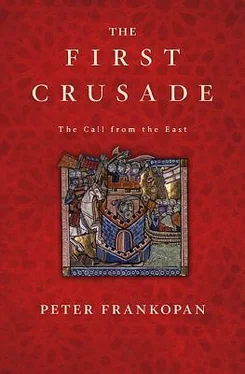In the tenth century, admittance to the ruler’s presence was an elaborate affair. As one eyewitness recalled: ‘in front of the emperor’s throne there stood a certain tree of gilt bronze, whose branches, similarly gilt bronze, were filled with birds of different sizes which emitted the songs of the different birds corresponding to their species ... Lions of immense size (though it was unclear if they were of wood or brass, they certainly were coated in gold) seemed to guard [the emperor], and, striking the ground with their tails, they emitted a roar with mouths open and tongues flickering. Leaning on the shoulders of two eunuchs, I was led into this space, before the emperor’s presence.’ At this point, a mechanical device raised the throne towards the ceiling, taking the sovereign out of speaking distance from the foreign visitor. 55
In his dealings with the Crusaders, Alexios opted for a style that would have astonished and appalled his predecessors. The emperor adopted an informal approach, designed to put the western leaders at ease. Indeed, some thought that Alexios was going too far; at one reception a particularly confident knight sat down on the imperial throne, left empty as the emperor mingled with his guests. After being reprimanded by a fellow knight he called the emperor names under his breath. ‘What a peasant!’ he reportedly said. When these comments were translated Alexios responded with grace, merely warning the knights of the stark dangers that lay ahead at the hands of the Turks. 56
The best example of Alexios’ dealings with the western leaders and of the lengths he went in order to win their support is his relationship with Bohemond. Bohemond was a highly charismatic figure, capable of inspiring strong feelings of loyalty among the Crusaders. Extremely attractive, he was clean-shaven – unusual in a world where warriors tended to be bearded. 57According to Anna Komnene, he was a man ‘unlike any other, whether Greek or barbarian, who was seen in those days on Roman soil. The sight of him inspired admiration, the mention of his name terror.’ He certainly had charm, though this was ‘somewhat dimmed by the alarm his person as a whole inspired’ – according to the Alexiad , ‘even his laugh sounded like a threat to others’. He was to go on to become Byzantium’s and Alexios’ nemesis.
The two men had fought each other tooth and nail in the early 1080s, and knew each other’s strengths and weaknesses. As he rode into Constantinople, Bohemond cannot have known what to expect, and when he was ushered straight into the emperor’s presence, the two men were soon talking about the past. ‘I was indeed an enemy and foe then’, Bohemond purportedly said, ‘but now I come of my own free will as Your Majesty’s friend.’ Alexios did not push matters too far at the first meeting. ‘You are tired now from your journey’, he replied. ‘Go away and rest. Tomorrow we can discuss matters at length.’ 58
Special arrangements had been made for the emperor’s former enemy. ‘Bohemond went off to the Kosmidion where an apartment had been made ready for him and a rich table was laid full of delicacies and food of all kinds. The cooks also brought in red meat and poultry, all uncooked. “The food, as you see, has been prepared by us in our customary way,” they said, “but if that does not suit you, here is raw meat which can be cooked in whatever way you like.”’ 59Alexios was not wrong to think that Bohemond would be suspicious: the Norman did not touch the food – although he insisted that his companions help themselves. Asked the next day why he had not eaten anything, his reply was unequivocal: ‘I was afraid he might arrange to kill me by putting a dose of poison in the food.’ 60
Alexios was generous with gifts and arranged Bohemond’s quarters so that he would find that ‘clothes, gold and silver coins and objects of lower value [had] filled the place so completely that it was impossible for anyone to walk in it. He ordered the man deputed to show Bohemond the riches to open the doors suddenly. Bohemond was amazed at the sight ... “All this”, said the man, “is yours today – a present from the emperor.”’ 61
The emperor’s extravagant generosity extended to the lower ranks of the Crusader army. Stephen of Blois reported that Alexios’ ‘presents are making the lives of the knights easier, and his banquets are re invigorating the poor’. 62Every week, four envoys were sent to Godfrey of Bouillon, and presumably to other magnates too, weighed down with gold coins intended for the rank and file. 63
Yet despite the care Alexios took in welcoming the Crusaders, things did not always go according to plan. The situation became uncomfortably tense following Godfrey of Bouillon’s arrival near Constantinople shortly before Christmas 1096. Despite repeated requests, the Duke of Lorraine refused to cross over the Bosphorus, plunging the emperor into ‘an ocean of worry’, as he was deeply concerned about the presence of a substantial body of experienced knights in close proximity to his capital. 64When Alexios’ efforts to encourage and cajole Godfrey to cross over had little effect, he resorted to more direct methods. A heavily armed squad was dispatched under the command of his son-in-law, Nikephoros Bryennios, with orders to use force to move Godfrey and his men away from the city to their designated quarters on the eastern side of the Bosphorus. 65
It was not long before the Byzantine troops and Godfrey’s men engaged. ‘Roaring like a lion’, the duke himself killed seven members of the imperial force, while Bryennios’ unerring aim as an archer marked him out as an equal to Apollo himself – at least in his wife’s eyes. The significance of the encounter, however, lay less in the prowess of those who fought and more in the fact that Alexios had to resort to force to make the Crusaders obey his instructions. 66
To start with, these efforts to dislodge Godfrey had little effect. His men ransacked the grandest properties on the outskirts of Constantinople, causing extensive damage to the city and its citizens. 67When the military response did not work, Alexios decided to withdraw supplies and he ‘removed barley and fish from sale, then bread to eat, so that the duke would be forced in this way to agree to see the emperor’. 68This was a bold move, which risked escalating the situ ation. But it worked. Godfrey backed down and agreed to meet with the emperor in person after Alexios offered his eldest son, still not ten years old, as a hostage in yet another attempt to win over the duke. 69
Godfrey and his followers arrived for their meeting splendidly attired, in ermine and marten robes lavishly fringed with purple and gold – clothing that was symbolic of their power and status. 70Terms were finally agreed between the two sides, with Godfrey consenting that his men be transported across the Bosphorus to join up with the other knights at the designated holding camp near Kibotos. In return, he was rewarded with heaps of gold and silver, purple robes, mules and horses. 71Alexios got what he wanted. While largesse, bribery and brute force had failed, the withholding of supplies served to underline that Alexios held the upper hand in his relations with the Crusaders. As one westerner noted candidly, ‘it was essential that all establish friendship with the emperor, since without his aid and counsel we could not easily make the journey, nor could those who were to follow us by the same route’. 72Stopping provisions was an effective way of driving the message home. 73
The use of force was a last resort; in most cases, the handling of affairs by the imperial administration in 1096–7 was remarkably successful and the arrival of the western knights was managed calmly and smoothly. This was partly due to the attention and generosity that the emperor showed to the expedition’s leaders. But other, more practical steps helped minimise the threat to the capital. For example, access into the city itself was strictly controlled and westerners were only allowed through the forbidding walls in small groups. According to one source, only five or six people per hour were let into the city. 74
Читать дальше











